The day after my mother died, I surveyed her room in the coastal Sussex care home she had moved into only a week before. She hadn’t had time to make it a home.
There were some photos of my three children, a cactus and an aspidistra, but that was it. In the wardrobe hung a coat, her favourite old dresses and some jumpers. Tucked under the table, I found her grey suitcase covered in stickers from when she and Dad used to travel the world. It must have been 40 years old but that was my mum – if something worked, she kept it.
I dragged it out and inside found the precious memoir she was always writing, now never to be completed.
I carefully placed her other few possessions inside the case, along with some papers she had left on the table.
It was an emotionally draining time. Mum had died aged 86, four days before Christmas. My fiance Tim and I went ahead with the holiday rental house we had booked in Hastings, East Sussex, big enough for us and our families (we have five children between us). But it was so sad to think how much Mum had been looking forward to it; she had bought and wrapped small gifts for us all that she would never see us open.
It wasn’t until the new year, when I was back at home, that I sat down to look through her few papers.
The first one that struck me was an empty white envelope. I turned it over and saw a note on the back in her distinctive handwriting. No date and no ‘Dear Helen’, though she must have written it recently, and who else but me was going to read it?
The message made my mouth fall open.
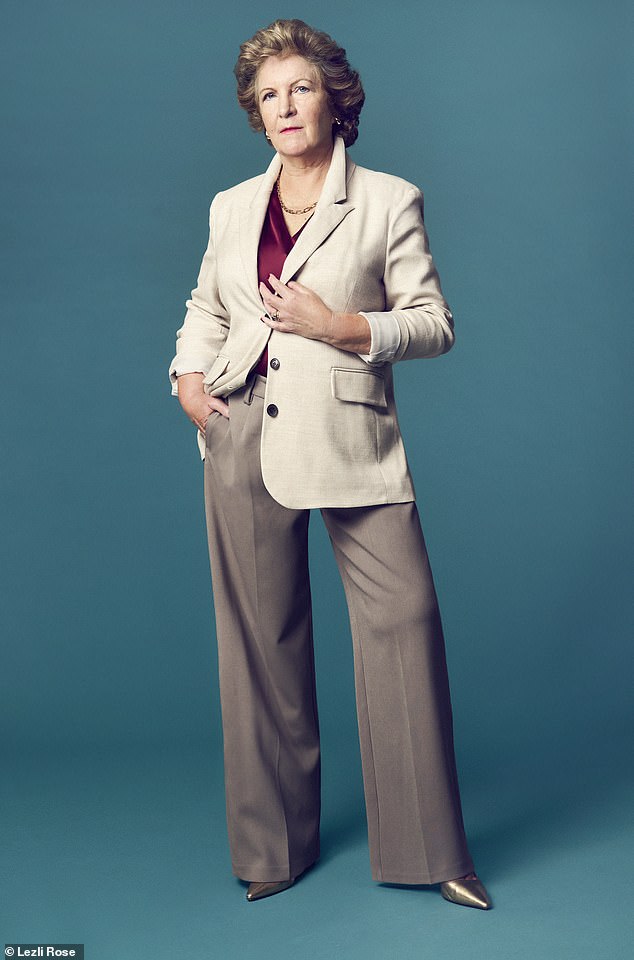
Helen Garlick discovered that her mother was a lesbian after her death
‘I don’t understand why I am different. Afflicted. It’s not talked about and no one ever mentioned it. I wonder how other lesbians cope?’
Below it were a list of six women’s names, including Gwen, Mum’s lifelong friend whom I was close to.
‘What?!’ I could see the words but couldn’t believe my eyes.
I called Tim over and asked: ‘What does that word say?’
He confirmed it: ‘Lesbians.’
We both burst out laughing from shock and astonishment. I had never had the tiniest inkling that Mum was gay.
So many questions filled my mind. Why hadn’t she said anything? Why keep this from me all her life? I was a family lawyer, entrusted with people’s most intimate secrets, but clearly not my own mother’s. Surely I should have suspected something, worked it out?
The word ‘afflicted’ was like a knife in the gut. We’re a liberal family. My poor mum, thinking there was something wrong with her.
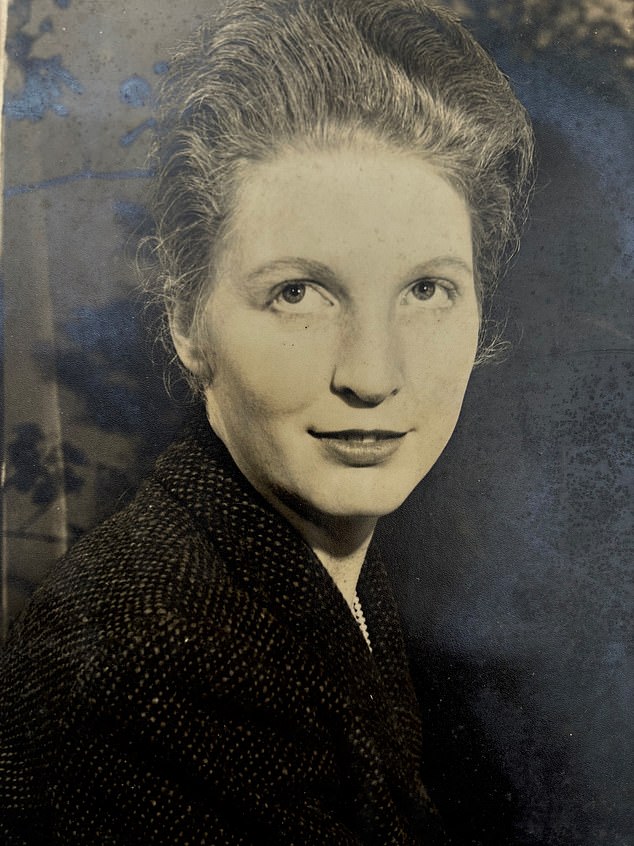
Helen’s mother Monica Garlick, pictured around 1963
My parents, Monica and Geoffrey, had been married for 59 years until Dad, then 83, died of vascular dementia and kidney disease in 2014.
I had never thought about my parents’ sex life – who does? I’d long known it hadn’t been a very happy marriage but as a child, it was all I knew, so it was my normal.
My main thought was how like Mum it was to leave on a bombshell. Blonde with blue eyes, she was like an ice queen; she kept her counsel until she had a drink and then she would hold forth.
Mum loved bold statements like: ‘I don’t do animals or children!’ pausing to add: ‘Except for you.’ It always made me feel wretched.
There’s no denying she was distant with me and favoured my younger brother, David, whom she always said she ‘idolised’.
She would tell me off for crying, saying I was too sensitive. But I was a normal little girl who cried when my feelings were hurt and she hurt me carelessly.
Could this note be the answer to her detachment from me?
That said, growing up I was so nervous around her. She was a good mother in a practical sense, doing all the things mums are supposed to do. But there was always an unreachable part to her; something she kept from me.
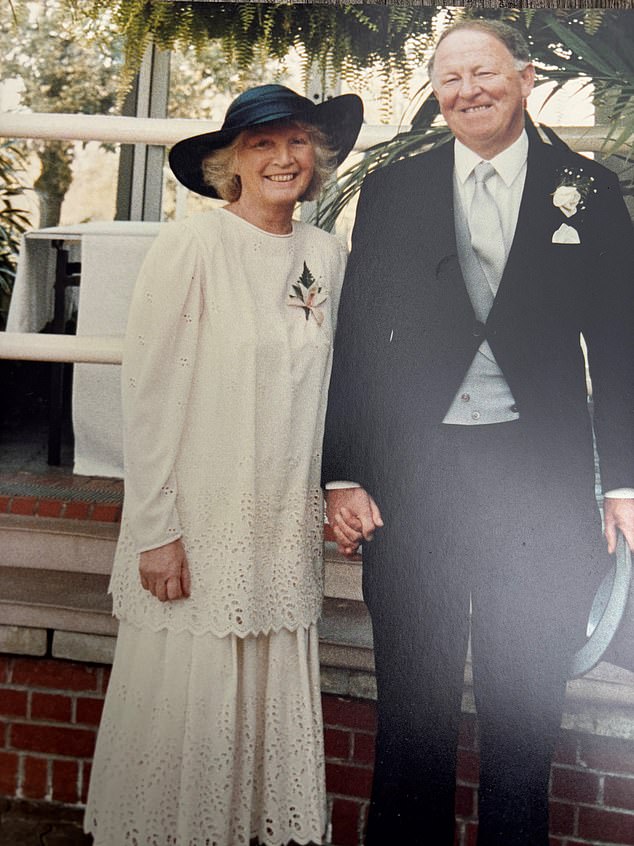
Helen’s parents Geoffrey and Monica at Helen’s first wedding in April 1989
I had always felt that she had a secret: I would walk into a room and sense an atmosphere. For a while I imagined I was adopted and fantasised about my ‘real’ family. But that was ridiculous; I looked exactly like my mum. Still, there was something . . .
Dad was a Cambridge-educated solicitor with practices in Doncaster and Sheffield, and Mum was his secretary.
When I was ten, Dad bought a magnificent William and Mary-style mansion in Slade Hooton, South Yorkshire, at an auction.
Our new house was a dream, with eight bedrooms, a drawing room with chandeliers and paintings, a dining room, a billiard room and paddock for my own pony.
My parents embraced the middle-class 1970s lifestyle, drifting around in kaftans with gin and tonics before dinner, lots of wine and whisky afterwards. They loved hosting weekend parties, where Mum would put on a cordon bleu show – soufflé, main course, cheese and a fruit savarin.
Paella was a favourite. They loved Spain and bought a villa there, a flat in London and a house in Cornwall – all done on a wing and prayer. Looking back, I never saw her flirt with anyone at these parties – women or men – oh God, no.
They put on a show of being happy but had to sell Slade Hooton Hall in 1976 and move into a much smaller house in Doncaster because of debts.
Five years later, tragedy struck when my brother David, who had lost his university place and was living alone, took his own life.
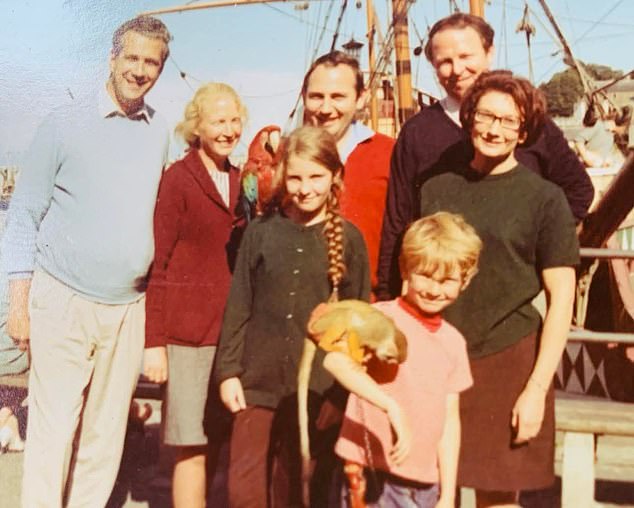
Helen, then nine, and brother David with mum Monica, second left, and dad Geoffrey, second right, and family friends
Dad insisted it was an accident. Mum knew the truth but didn’t contradict Dad. Grieving in opposing ways like that breaks many couples, but they endured it together.
Sadly, David and I, once so close, had drifted apart over the years. After studying law at Bristol, I had moved to London for a job with a prestigious law firm. I went on to marry Richard, a fellow lawyer, and have our three children, two girls and one boy. We divorced after 25 years, but I still have a much closer, more open relationship with my children than Mum ever did with me.
It still startles me to think of her private life.
After I read the list of women’s names on the envelope, I homed in on Gwen. She was a lifelong family friend and someone I spoke to a lot, especially over the decision about Mum going into the care home because Gwen had been her best friend – and now, it seemed, her lover?
I always knew about Gwen’s sexuality because she was as ‘out’ as you could be back then, and later in life she entered a civil partnership with a woman.
My parents were always very accepting of her and she was a good friend to me growing up – a wonderfully funny and kind woman, and a great listener.
I didn’t sleep that night wondering if I should let it lie.
Should I say anything to anybody else? My children? My aunt Judy, Mum’s younger sister? Was it Mum’s secret or my secret now?
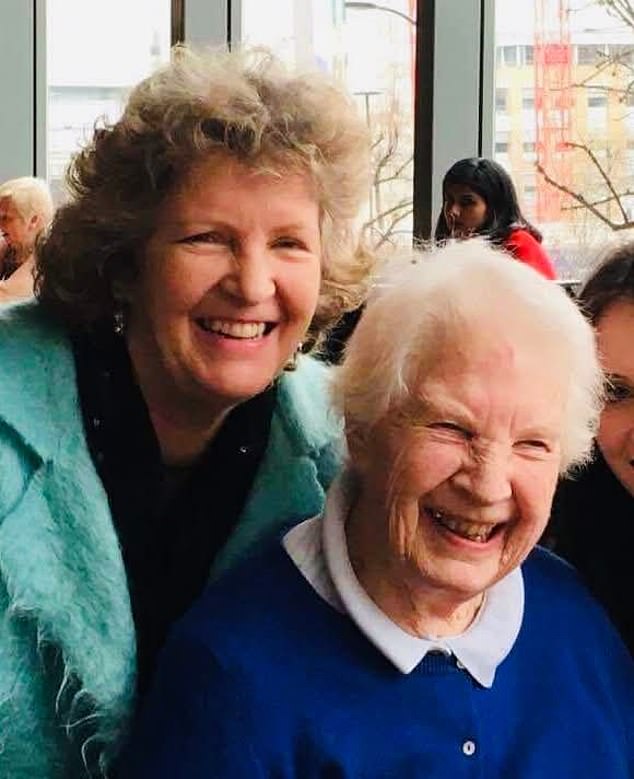
Helen with her mother in 2017
By morning I decided to find out if it was true. Mum was dead now, anyway, so what harm could it do?
The next day I emailed Gwen saying what I had read and we arranged a call the day after.
She answered and said: ‘I’ve been waiting for this for so long. I will tell you everything you want to know.’ And out it all came. Gwen was my aunt Judy’s friend and she had met Mum at a birthday party in the early 1950s. Mum was older than Gwen, but they hit it off and slowly the friendship deepened into a love affair.
Gradually, they hatched the most outrageous plan, scraping their savings together to start a new life in London, leaving it to the last minute to drop the bombshell to their families but never admitting that they were lovers.
They found a tiny flat in Knightsbridge, just behind Harrods. Mum got a job as a secretary in a Holborn law firm and Gwen joined a model agency. Not as a model – she was short and square – but as a bookkeeper. They passed themselves off as just good friends. Lots of girls shared flats and if anybody wondered about the precise nature of their relationship, they never asked.
So this was Mum’s secret. I knew she had spent some time in London before marriage but never this. Imagine the excitement of leaving dreary post-war Doncaster behind to be with your first love. I don’t blame her one bit.
But six months later, my grandmother came to London and ordered them both home.
‘You have to get a job and a husband,’ she told my mum and so that’s what she did, meeting and marrying my father in 1955.
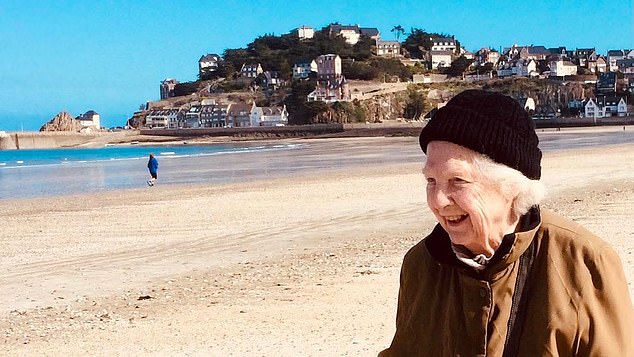
Monica in Brittany in October 2013. Before meeting Helen’s father, she had lived with a female partner in London
Gwen told me she was sad but accepted that that was the end of their affair, but they remained friends for life.
And there was more…
After Gwen returned to Yorkshire, she trained as a nurse, and eventually became matron of the local hospital. In an act of unbelievable generosity, she became a kind of matchmaker to my mother in the early 1960s, when I was a young child.
I didn’t want to know how many affairs my mum had but a significant one was with Margaret, who I also grew up thinking was just a family friend.
Bewitching with greeny-blue eyes and very flirtatious with both men and women, she ended up as a housekeeper in London for a lord.
When I moved to London to train to be a solicitor, Margaret invited me for lunch one day in the lord’s beautiful big house in Regent’s Park. Over quiche and strawberries, she asked after Mum but in a friendly way that gave no clue as to the reality of their relationship.
Gwen said Margaret, who was now dead, was the only person my mother ever really loved. That made me smile – I was glad Mum had been so happy.
She also said that she didn’t know if my dad knew the truth about Mum’s sexuality. Despite them all being good friends, she had never discussed it with him. She said it was my mum’s truth to tell, not hers.
After a few phone conversations over several days, Gwen ended by saying: ‘That’s it. There is no more I can say.’
As I put down the phone, relief washed over me. I finally knew as much of the truth as I was ever going to know. My feelings towards Mum were mixed. I was sad she had never told me, but my feeling that she had always been withholding something was now vindicated.
It was in her nature to deliberately keep a secret as she would enjoy the power it gave her over us – but the truth was, I clearly knew her better than either of us thought.
After the talks with Gwen, it was time for Mum’s funeral on January 31, 2018. It was a gorgeous day with friends and family and a small do at the local pub. I didn’t ask anyone else – I knew I wouldn’t find out anything more. Mum had kept her sexuality private, that much was clear.
That’s not to say there aren’t further questions. Namely, did Dad know? I concluded that there’s no way he couldn’t have. I think they had an understanding, but, of course, I’ll never know for sure.
And as for their relationship, Mum loved him in her way. When he was dying, she was upset but quiet in the hospital room. His death left a huge gap in her life and she withdrew more into herself.
I understand theirs was a time when homosexuality had to be hidden, and was still illegal for men. For women, people turned a blind eye but it wasn’t something to talk about.
I also understand that post-war, there was a culture of people just getting on with it rather than making a big show or drama.
And yet there was that word Mum had written on the envelope: ‘Afflicted.’ It haunted me that my poor mum was never at peace with her sexuality. I wished I could tell her that she had no need to feel shame but, of course, it was too late.
Earlier this year, nearly eight years after Mum died, I finally plucked up the courage to read her memoir. My conflicted feelings about her had meant I couldn’t face the upset it might contain. Perhaps she would be frank in its pages about her dislike of family life. After all, she had always been clear she didn’t ‘do’ motherhood.
I prepared myself to read that, and to know the details of her secret loves. But, above all, what I wanted to see on those pages was some indication that she really did love me.
At that point Tim and I were about to move to our dream home – a converted barn filled with light in the peaceful village of Avebury, set near the stone circle in the idyllic Wiltshire countryside. What could possibly hurt me?
With a friend to support me, I sat in a patch of sunshine in the living room and opened it. The irony is, having built up the contents for so long, it was so boring! Nothing about her secret life, just lists of people who would come to stay and the things she had cooked them.
In fact, the only interesting thing Mum wrote was that being with her grandchildren was the happiest time of her life.
Despite having been remote and distant parents, she and my Dad had been devoted grandparents, lavishing the children with time to listen and talk, and do fun things.
There’s no doubt that I feel more compassion for Mum. Yes, she had married a man who gave her an incredibly privileged lifestyle, but at what cost?
What I have learned is that it’s so important to talk. To be yourself, to express your thoughts and feelings, to be ‘real’. My mother might have had all the material possessions but she didn’t have that luxury.
Did she regret it? I’ll never know.
- No Place To Lie by Helen Garlick (£9.99, Whitefox Publishing) is out now. Helen Garlick (helengarlick.com) is an ambassador for zerosuicidealliance.com
- As told to Gillian Crawley












